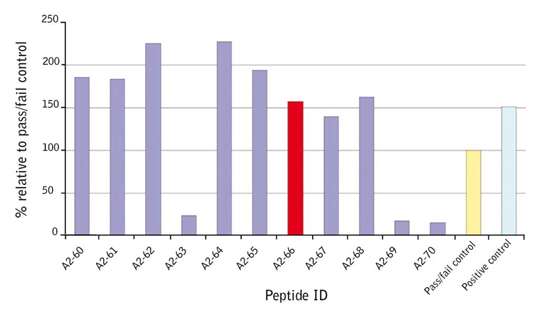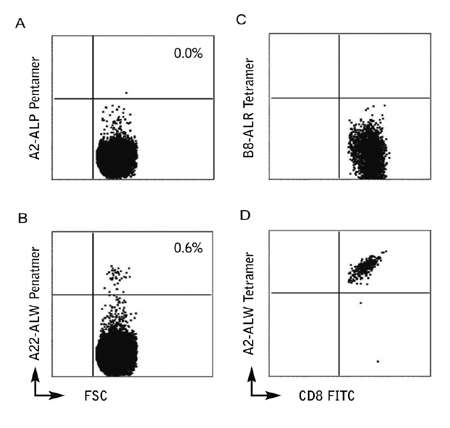Your basket is currently empty!
Discovery of first VZV HLA-A2 epitope using ProImmune REVEAL and ProVE technology
Discovery of first VZV HLA-A2 epitope, using ProImmune REVEAL® & ProVE® technology
Van der Heiden, PL. et al. (2009). Identification of Varicella Zoster Virus specific CD8 T cells in patients after T cell depleted allogeneic stem cell transplantation. J Virology. 83(14): 7341-7364. [PubMed ID 19386715]
Varicella Zoster Virus (VZV) is a persistent virus that infects the majority of the population and can lead to the development of herpes zoster when the virus is reactivated. In patients who have received T cell depleted allogeneic stem cell transplantations (TCD alloSCT), reactivation of the virus has been shown to cause serious illness.
Previously there were no known MHC class I restricted epitopes identified for specific alleles for VZV, which has hampered analysis of cytotoxic T lymphocyte (CTL) responses in this disease. Van der Heiden et al used ProImmune REVEAL® HLA-peptide binding assays to determine the binding affinity of peptides from the intermediate-early 62 (IE62) protein required for VZV replication.
Predictive algorithms were initially used to pre-screen overlapping peptides from the IE62 protein and those with potentially significant binding affinity were synthesized as a Prospector PEPscreen® custom peptide library for analysis in the HLA-peptide binding assays. Peptide binding was compared to that of a known epitope with intermediate binding to A*02:01 and those that scored higher than the intermediate control were identified as putative epitopes and taken forward for further validation using ProVE® Pentamers.

Figure 1: HLA-peptide binding assay data for VZV peptides to the A*02:01 HLA complex. The binding for this selection of peptides is shown relative to two known T cell epitopes with strong binding affinity (positive control) and weaker binding affinity (pass/fail control). Peptide A2-66 (red) is the A*02:01/ALWALPHAA epitope that was further validated using ProVE Pentamer staining.
Thirty-four A*02:01-restricted ProVE Pentamers were grouped into 5 pools, each containing 6 or 7 Pentamers, and screened against PBMC from patients who had been diagnosed as VZV-positive after receiving a TCD alloSCT. Results from one of the pools yielded Pentamer-positive staining and further staining with the individual ProVE Pentamers confirmed that a single IE62 VZV epitope (A*02:01/ALWALPHAA) was responsible.

Figure 2: PBMC of a TCD alloSCT patient after VZV reactivation stained with an irrelevant Pentamer (A) showing no specific staining, and the A*02:01/ALWALPHAA Pentamer (B) showing positive staining. A*02:01/ALWALPHAA positive cells were cloned, expanded and stained with an irrelevant tetramer (C) or the A*02:01/ALWALPHAA specific tetramer (D).
This is the first description of an A*02:01 specific response detected for a VZV epitope in patients who have VZV reactivation after TCD alloSCT. ProImmune’s REVEAL & ProVE® Epitope Discovery System was central to this finding and this study demonstrates a key application for this technology.
